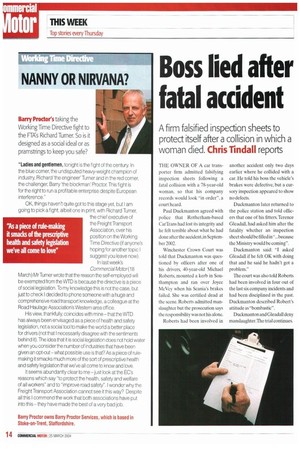NANNY OR NIRVANA?
Page 14

If you've noticed an error in this article please click here to report it so we can fix it.
Barry Proctor's taking the Working Time Directive fight to the ETAS Richard Turner. So is it designed as a social ideal or as pramstrings to keep you safe?
"Ladies and gentlemen, tonight is the fight of the century. In the blue corner, the undisputed heavy-weight champion of industry Richard the engineer' Turner and in the red corner, the challenger, Barry the blockman' Proctor. This fight is for the right to run a prof able enterprise despite European interference."
OK, things haven't quite got to this stage yet, but ¶ am going to pick a fight, albeit one in print, with Richard Turner, the chief executive of the Freight Transport Association, over his position on the Working Time Directive (if anyone's hoping for another topic I suggest you leave now).
In last week's Commercial Motor (18 March) Mr Turner wrote that the reason the self-employed will be exempted from the VVTD is because the directive is a piece of social legislation. To my knowledge this is not the case, but just to check I decided to phone someone with a huge and comprehensive road transport knowledge, a colleague at the Road Haulage Association's Western area office.
His view, thankfully, coincides with mine -that the WTD has always been envisaged as a piece of health and safety legislation, not a social tool to make the world a better place for drivers (not that I necessarily disagree with the sentiments behind it). The idea that it is social legislation does not hold water when you consider the number of industries that have been given an opt-out-what possible use is that? As a piece of rulemaking it smacks much more of the sort of prescriptive health and safety legislation that we've all come to know and love.
It seems abundantly clear to me -just look at the EC's reasons which say "to protect the health, safety and welfare of all workers" and to "improve road safety". I wonder why the Freight Transport Association cannot see it this way? Despite all this I commend the work that both associations have put into this -they have made the best of a very bad job. "As a piece of rule-making it smacks of the prescriptive health and safety legislation we've all come to love"






























































































































































































